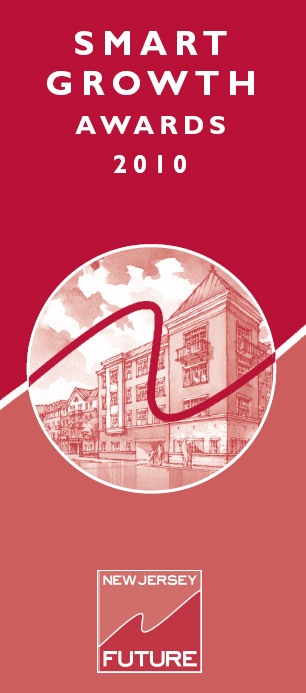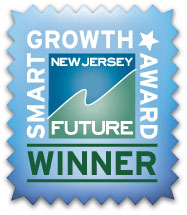New Jersey Future Blog
Smart Growth Award-Winners Show Innovation, Creativity
May 26th, 2010 by Jay Corbalis
- Six projects and plans, ranging from an innovative transfer-of-development-rights plan in Gloucester County to a creative neighborhood affordable-housing project in Jersey City, have been selected to receive 2010 Smart Growth Awards from New Jersey Future. Winners are selected from a statewide public nomination process by an independent jury of professional developers, architects, planners and redevelopment experts.
- Since 2002, New Jersey Future has honored 56 projects. The majority have been downtown and neighborhood revitalization projects (19) and vision/redevelopment plans (17). Others have included housing and community support projects (14), educational facilities (4) and arts centers (2).
- The State Planning Act, adopted in 1985, has been the legislative guide for smart, sustainable growth in New Jersey. As chief counsel to Governor Thomas H. Kean at the time, W. Cary Edwards was one of the chief architects—and a driving force behind the passage—of this landmark legislation.
Six Projects and Plans Garner Awards for 2010;
W. Cary Edwards Honored for Years of Leadership
 On June 2, New Jersey Future will honor the six Smart Growth Award-winners at a reception at the Newark Club. New Jersey Future will also honor former Chief Counsel to the Governor and state Attorney General W. Cary Edwards, a charter member of the New Jersey Future Board of Trustees, with a special Leadership Award for his forceful, influential and effective advocacy for smart growth for the past 25 years.
On June 2, New Jersey Future will honor the six Smart Growth Award-winners at a reception at the Newark Club. New Jersey Future will also honor former Chief Counsel to the Governor and state Attorney General W. Cary Edwards, a charter member of the New Jersey Future Board of Trustees, with a special Leadership Award for his forceful, influential and effective advocacy for smart growth for the past 25 years.
The Historic Golden Swan Inn & CWA Office Development has turned a 200-year-old tavern in the heart of Trenton’s historic district into a mixed-use structure that features retail and office space on the first two floors and loft-style apartments on the third. Infill construction has transformed an abandoned property across the street into two floors of office space that house the state headquarters for the Communications Workers of America and a retail store on the ground floor.
The Lafayette Gardens Hope VI Revitalization is in the process of converting a 450-unit public-housing site and a former underutilized industrial property near Liberty State Park in Jersey City into a true mixed-income urban community. To date, 209 mixed-finance, mixed-income units have been built, and community support spaces have been constructed within an area designated as the Morris Canal Redevelopment Area. An additional 59 affordable senior rental apartments with on-site services are under construction; future plans call for 125 mixed-income family rental townhouses and 24 affordable for-sale homes.
In neighboring Hoboken, an industrial site once occupied by Maxwell House Coffee and historic Elysian Fields (where the first known baseball game was played using modern rules) are being transformed into Maxwell Place on the Hudson, a modern, mixed-use complex that reconnects the community with its long-obstructed Hudson River waterfront. Also included in the project are a waterfront park, restored beach, kayak pavilion, pier shed, and waterfront walkway offering spectacular views of Manhattan.
MidTown Commons is part of a strategic plan to revitalize one of Neptune’s “Gateway” areas along West Lake Avenue, often referred to locally as the Midtown district. The first phase of the plan has produced a 51,000-square-foot office/health center complex that provides access to medical treatment in an underserved area, and has brought 50 permanent professional and administrative jobs to the neighborhood. The completed project will create a “Life Style Services” neighborhood in the Midtown district that will allow for goods and services to be provided in a walkable range for residents.
Robbinsville Town Center seeks to generate a “sense of place” in Robbinsville (formerly Washington Township), Mercer County by creating a town center in the heart of a once-rural community whose identity was being lost to suburban sprawl. Housing styles in the mixed-use town center range from small-lot, single-family homes to duplexes, townhomes and loft units. Retail and office components work to create a vibrant mix of uses; two-thirds of the existing office space has been leased; and the project has contributed significant green space to the community.
The Transfer of Development Rights Plan adopted in Woolwich Township, Gloucester County represents an innovative effort to accommodate growth while preserving 4,100 acres of farmland, open space and woodlands. Woolwich’s TDR Plan includes a center-based design that is functional and more economically viable than the predominant sprawl pattern of development. It includes a mix of residential, retail and office uses and a variety of housing types. And it ensures that large, contiguous blocks of land will remain undeveloped, supporting agriculture, enhancing habitats and offering scenic vistas.
Nominees for Smart Growth Awards are judged against the following criteria:
- located near existing development and infrastructure;
- increase the range of housing options;
- create or enhance a vibrant mix of uses (residential, retail, office);
- protect open space, farmland and critical environmental areas;
- create or enhance choices for getting around;
- create walkable spaces, designed for personal interaction; and
- respect community character, design and historic features.
For detailed descriptions of this year’s and previous winners, as well as additional information about the June 2 Smart Growth Awards celebration, please visit our website at www.njfuture.org/sga.
Related Posts
Tags: Smart Growth Awards
















